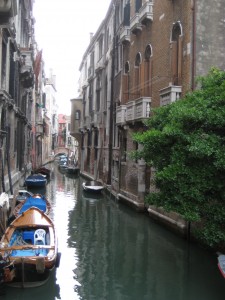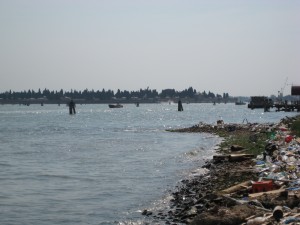You really only need ten things on a trip …
Verge Magazine: Spring 2008
“Why do you have 14 rolls of toilet paper?,” I asked a traveler I met at a hostel in Delhi.
“I’ve heard they don’t have toilet paper in India,” he explained, unpacking his massive backpack.
Over the years I have concluded, usually when I see travelers burdened like pack animals, that bringing less (and not believing everything you hear) is more likely to make for an enjoyable trip. At the very least, there is the satisfaction of sauntering past a group of tourists — many of whom have pushed past you to get out of the plane — as they wait impatiently for their luggage at the baggage carousel.
There are only ten items needed for a successful voyage abroad:
Ten. Damp washcloth, in a plastic bag. Whether it’s to wipe sweat off your brow, grime from the back of your neck, or the juice of an orange from your hands, this item is easily worth its weight.
Nine. Passport, also in a plastic bag. The bag comes in handy, like when a big wave drenches you while admiring the sunset from a pier in Rabat or when your momentum is not enough to carry you (even with a Y-shaped branch stuck in the mud to serve as a launching pad) across an eight-foot canal in the Irish countryside.
Eight. A small stash of cash and a credit or bank card. But keep them separate — you don’t want to lose everything to a pickpocket in one shot. Bank machines are now common virtually everywhere. But limit the amount of emergency cash and don’t hide it in a backpack that is being loaded atop a bus, like a couple I met in Morocco did with $700 U.S. along with their gold wedding rings.
Seven. Re-usable water bottle (and purifier). Leaving behind a collection of plastic water bottles that may wash up on the shore of places like Venice is no way to show your appreciation. The bottles are especially nasty in poorer countries where garbage is often burned in open fires. If you’re worried about water quality bring a good water purifier, instead of leaving a souvenir that will be around longer than the 1,000-year-old marvels or masterpieces you have come to see.Â
Six. Toothbrush and dental floss. Bad breath will make a bad impression everywhere you go, and make people hurry in giving you directions. The floss can also be used to repair a backpack, leaving it minty fresh.
Five. A map. What’s the point of going anywhere, when you don’t have any idea of where the hell you are. And when you are rushing for the last bus out of town in Algeciras, Spain it will keep you from going west to Cadiz thinking you are making headway towards Barcelona, in the northeast.
Four. A change of clothes. Today’s lightweight materials mean a shirt and pants, along with extra socks and underwear, will weigh less than a pair of jeans. These materials also dry fast, in case you find yourself at the bottom of an Irish canal (after over-estimating your long-jumping skills). Shirts with buttoned pockets are preferable since valuables will be safer there from pickpockets. Long-sleeved shirts and long pants (convertible to shorts) are best since they are more acceptable in holy places and provide better protection from mosquito bites, including ones carrying malaria, and the sun.Â
Â
Three. A hat and sunglasses. Protect your eyes. In equatorial countries your eyes are especially prone to sun damage – a danger that’s been made worse with the thinning of the ozone layer. Developing a pytergium (or small bump) on the eye may sound exotic, but it’s annoying and long-lasting. There’s certainly no need to expose yourself to the carcinogenic dangers of a sunburn. But don’t overdo it – a triangular umbrella for your nose just gives the rest of us travelers a bad name.
Two. A book. Instead of cussing and making a bad impression when your bus breaks down or you have to stand in a long queue to see Michaelangelo’s David in Florence, bring something to read, which will pass the time pass more productively than pondering the back of somebody’s head.
One. Attitude. You can buy or replace the rest of the items en route. Remember, for instance, that the primary function of local people is not to make sure you have a pleasant stay — indeed most of them are engaged in activities more important than you catching the last train to Copenhagen. When things really aren’t working — when the hostel is full, the ferry isn’t running, or you can’t understand anyone’s explanation of why the banks are all closed — RELAX: sit down, drink a beer (or two), and eat a meal. You (and the local people) will have a better time. And while there may indeed be people along the way who mean you ill, they are a tiny group. If you do have a bad experience, just record it is as a bad experience. Focus instead on one or more of the nice folks among the billions to choose from.  Â
And what advice did I have for the traveler with the 14 rolls of toilet paper? Only that he could probably make do with 13 – and I could lighten his load by taking one off his hands.
(This is a longer version of the edited version that appeared in Verge.)

